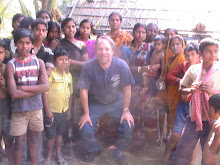Congressional Candidate Joel Pollak Focuses on Indian Americans
Joel Pollak is running for Congress from Illinois’ Ninth District and has made the Indian-American community an integral part of his campaign; a role he pledges to carry with him to Washington if elected. I sat with Pollak for over an hour one hot August afternoon near Chicago’s Devon Avenue as Shri Baba Brajraj Sharan gave a presentation on the ecological and spiritual degradation of India’s Braj Region, legendary home to Lord Krishna. Though it overran another commitment of his, Pollak remained transfixed on Baba’s presentation, later speaking emotionally about what he saw and his own experiences. Pollak’s biography suggests that his love for the Indian community is neither new nor political. Rather, as one community member told me, “it is a good partnership.”
He is running to represent the large NRI populations on Chicago’s North Side and in many of its suburbs. Despite the community’s size and vibrancy it has been under served, he believes, by incumbent Congresswoman, Jan Schakowsky, who "has been in Washington for 12 years and never once took up any issue of importance to us," according to a community member. Pollak vows to change that and has empanelled an Indian-American Advisory Committee with significant influence in his campaign. In the first of several interviews, Pollak spoke about foreign policy issues involving India and China.
RB: In 2005, your opponent voted against legislation to deter arms sales to China. Recent news suggests China’s arms industry is now outpacing our own. First, do you believe that China constitutes a threat to the United States and India; and second, if so, what would you as a member of Congress do to reduce or counter that threat?
JP: China’s military buildup and increased assertiveness around the world have raised the prospect of intensifying security competition both between China and the U.S., and between China and other countries in the Asia-Pacific. I believe that China’s foreign policy could be very destabilizing—unless, that is, the U.S. remains firm in defense of our allies overseas. In Congress, my policy towards China will involve commitments to defend loyal, democratic allies like India and strengthen diplomatic and security relations. India is a partner in the war against terrorism, and also in the global struggle for human rights.
RB: China has claimed the Indian State of Arunachal Pradesh and its hydro-electric resources, critical to both China’s and India’s burgeoning economies. Having seen China’s expansionist bent from Tibet to Hong Kong and other claims once thought ridiculous gain credence in the international arena; how would you prevent China from seizing Arunachal Pradesh and its critical resources?
JP: Yes, China has increasingly disputed Indian sovereignty over Arunachal Pradesh and even increased operations along the border. The Obama Administration has ignored India’s concerns, and gone so far as to make joint statements with Beijing promising to “work together” to promote security in South Asia. I think that is the wrong approach. The Administration should stop taking the friendliness of Beijing’s intentions for granted, and instead develop a realistic, strategic plan to prevent the outbreak of conflict along the border. We should deter China from further inflaming border tensions with India, or from launching an invasion, by projecting strength, defending our alliance with India, and passing a clear, unambiguous resolution promising that we will not stand by idly if China invades or destabilizes Arunachal Pradesh. As your representative in Congress, I will propose such a resolution, and I will encourage the House India Caucus and other members to sign on.
RB: Former Indian Cabinet Minister Dr. Subramanian Swami has noted that the Chinese economy is dependent on importing semi-raw goods from other Asian nations and exporting them to the West. He further suggested that convincing those nations to send their products through India instead would be an economic game changer. What is your reaction to that?
JP: America has become India’s largest trading and investment partner. However, India still has many tariffs and non-tariff barriers that discourage countries from exporting to India. One goal of our economic partnership with India should be to encourage further domestic liberalization to boost Indian economic growth and market access for companies wishing to send their partially produced products to India. In exchange, we could offer Indian greater access to American labor markets by lifting the cap on H1B visas.
Schakowsky has coasted to victory in previous elections thanks to Chicago’s legendary machine; but this is no ordinary election year, and Pollak is running neck and neck with his powerful opponent in what is shaping up to be a real “David and Goliath” race. Political newcomer Pollak (David) looks to be in position to upset Schakowsky (Goliath) in a race that mirrors events elsewhere around the country. As Pollak himself noted, "We have taken a ‘safe’ seat and turned it into a competitive race that is giving real power to the people of the 9th District." And a big piece of that power pie is going to Indian-Americans with whom Pollack and his wife Julia have longstanding personal and cultural ties.
Imagine, a US Congressman who knows about Arunachal Pradesh!
Labels: 2010 election, Arunachal Pradesh, Indian-Americans, Jan Schakowsky, Joel Pollak

